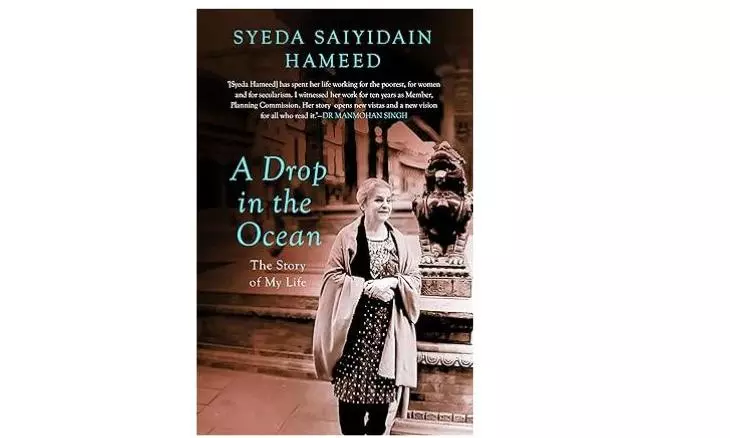Book Review | Syeda Hameed’s life of compassion

It is difficult to slot 81-year-old Syeda Saiyidain Hameed in any one box. A well-known Delhi figure, she wears many hats — writer, poet, human rights activist, champion of women’s empowerment and, above all, a passionate advocate of communal harmony and Indo-Pak unity.
It is, therefore, no surprise that her memoir, A Drop in the Ocean, makes for an engrossing read. Among these is a particular touching story about how she was made aware of her religious identity as a young girl when the other children refused to play with her because she was a Muslim. Though hurt, she did not allow herself to get embittered. Instead, she wrote a prize-winning story based on this episode and in later years, became an active participant in movements promoting peace and amity among Hindus and Muslims.
But Syeda Hameed had an advantage as she comes from a privileged background — her father was an eminent educationist picked by Maulana Abul Kalam Azad to formulate India’s education policy, her mother was from the Rampur royal family, noted writer and filmmaker K.A. Abbas was her uncle, Mohammad Yunus was a family friend and so on. She resided in Lutyens’ Delhi, was a student of Modern School, went on to graduate from Miranda House and followed it up by pursuing her higher studies in the US. After marriage, she lived in Canada for several years where she opted for a career in academics.
And yet Syeda did not confine herself to the upper-class elite circles she grew up in. Nor did she opt to live an idle life of luxury. She pursued her writing — her first story was published in Shankar’s Weekly in 1951 when she was nine years old — and went on to translate the works of several greats like Maulana Azad, Ghalib and Faiz.
In addition, Syeda plunged herself into activism on her return to India after 17 years in Canada. It was during her tenure at the National Commission for Women that she came face-to-face with victims of “gender abuse, gang rape and honour killing”. This resulted in a compendium of their horrific experiences “They Hang: Twelve Women in my Portrait Gallery” in which Syeda recounted the story of the brutal lynching of Sajoni in Odisha who dared to defy tradition and ploughed her land or Maimul in Haryana’s Nuh district who was meted out similar treatment by villagers for daring to marry in the same gotra and was later shot dead by her brother.
Syeda’s subsequent stint at the Planning Commission led her to the country’s “remotest corners, sparsely inhabited places and ghettos” where again she listened to the voices of the marginalised. It is these stories which make for heart-rending reading.
While dwelling on the personal, Syeda is not afraid to admit to her ever-abiding belief in Islam. She prays regularly, fasts during Ramzan and follows the necessary rituals during Muharram. But her understanding of her religion, as taught to Syeda at home, is at variance with how it is perceived and practised. Islam, for her, encompasses all faiths, having decreed that “Hinduism, Christianity, Sikhism and Judaism are one at their core.”
This is the message she wishes to spread as her story begins and ends lamenting the disintegration of the country’s once-famed “Gangajamuni tehzeeb” which has given way to bigotry, intolerance and hate.
A Drop in the Ocean
By Syeda Hameed
Speaking Tiger
pp. 264; Rs 599

